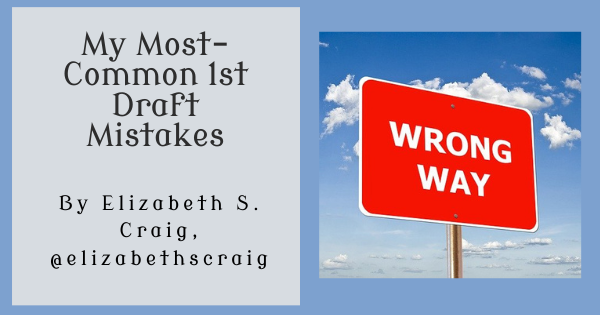by Elizabeth S. Craig, @elizabethscraig
First drafts are meant to be messy. It’s the time when we hammer out our story, taking it from a concept to something that, at least vaguely, resembles a book.
The nice thing about first drafts is that they can be fixed. That’s why I don’t worry over my drafts as I’m writing them; my goal is just to get from the beginning to the end. At this point, I’ve written around 50 first drafts. There’s definitely a recurrence of some issues over others. Once you know what your most common issues are, you can start looking out for them.
Crutch words: Everyone has them (at least, I hope they do). I track down “justs,” “thats,” and “reallys” and decide how many are necessary in my document.
Echoes: An echo is a repeating word close enough in a manuscript for a reader to notice it. Some repeating words fly more under the radar than others. Reading a passage out loud is one great way of finding repetition.
Continuity errors: I try to read as much of my first draft as possible in one sitting because it makes continuity errors so much easier to catch. Sometimes my characters will inexplicably be wearing different outfits at the end of a scene than at the beginning of it. Or someone will be driving their car back from the store when their friend had given them a ride there.
Lack of description: This is usually on-purpose because I skip character or setting description in the first draft since I don’t enjoy reading or writing it. The important thing is that I put it in the second draft…sometimes it’s easy to forget.
Rushing through relationship building of any kind: This might be specific to just me. I always tend to focus primarily on the mystery itself: the clues, red herrings, suspects, interviews, etc. But, as my Penguin editor used to tell me, readers care about the characters in their daily lives and interactions. I needed to show more of what their lives were like outside of the context of the mystery. That’s something I often address in the second draft.
These are my usual problem areas in a first draft, but what are yours? Do you have repeat offenders or are your issues different in different drafts?
5 Common 1st Draft Mistakes: Share on XImage by Gerd Altmann from Pixabay

Mine definitely lack description! Big time. And I have words I still tend to overuse even when I know not to use them.
Sounds a lot like me!
That’s the thing about first drafts, Elizabeth. They have those ‘pattern problems.’ You make a good point, too, about building relationships. I wonder if that happens because it takes a draft or two to really get to know a character….
So true that we don’t really know a character until much later in a project!
I’m only on my second first-draft revision. I like to revise a lot as I go so there is less to revise. I definitely have crutch words and need to work on plot changes/strengtheners/consistency issues. Thanks for sharing some good ideas on what to work on.
Congratulations on getting that far, Natalie! Hope the list here helps you out.
I’m slowly (and not consistently) getting better at spotting crutch words in the first draft – but I have a list of about 10 to check!
I’m not a descriptive writer either – I find it so awkward to add it in but I manage sometimes.
I often do it all in one fell swoop during a later draft. It can help if I’m already in the descriptive groove!
I have a few crutch words that can be repetitive in my first drafts, the word ‘that’ is also one of mine. I like the idea of skipping descriptions in the first draft. As I write Gothic fiction, it’s an important element, but it does tend to slow my writing down. I need to work something out to keep the momentum going. This is a very timely post during NaNoWriMo, so thank you for sharing, Elizabeth.
Like you, I really slow down while writing description. It helps me to do it all in one fell swoop later. Hope it helps, Debbie!
I also skim a lot of the descriptions when I read so I tend to gloss over them when I write. I also have to make an effort of going back and adding them in later.
We’re peas in a pod! I’m never interested in descriptions but I try to remember that many readers are.